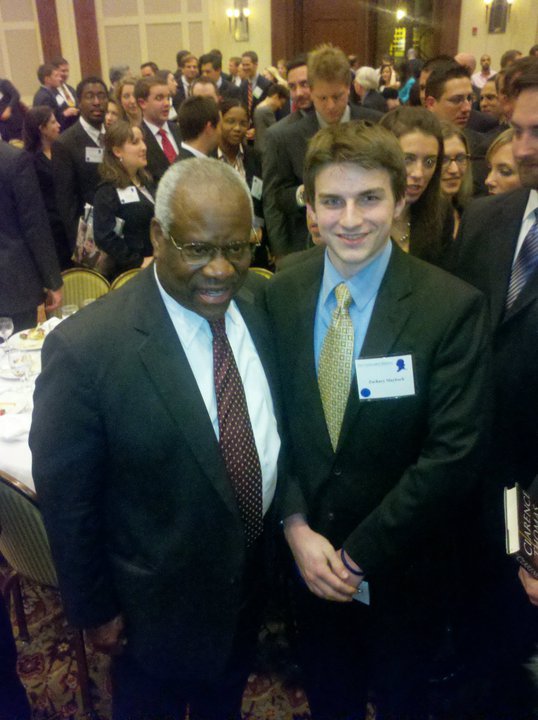This year, the Harlan Institute partnered with our friends at
ConSource to offer a
ConSource badge. By researching
primary sources from the time of the Founding available from ConSource, students considered whether the First Amendment places any limitations on a school’s power to punish students for things the students say on the Internet outside of school.
Check out some of the
best posts written by students that received the badge.
One student noted, quite astutely, that when the Constitution and Bill of Rights were authored two centuries ago, the Framers could not have possibly conceived of computers or the Internet:
225 years ago, in the year 1787, the original Constitution was proposed in Philadelphia as The Bill of Rights. When they wrote the first ten amendments, I don’t think they had computers, cell phones, or the internet in mind. They weren’t expecting all the technology we have now. So it’s hard to base court cases now with all the technology we have with the Amendments which seem old to some of us.
One student commented on the
dangers of bullying, especially in cyberspace:
The First Amendment should not protect those students for what they had done. If someone has an opinion like that, don’t take it to Facebook where the whole world can see. Bullying is illegal in the state of Iowa and no one seems to be enforcing it, even after someone takes their life. That law should be enforced all of the country, their has been more suicides recently then there has been in a long time. Just because something like this was said online doesn’t mean anything. It just shows that there is proof to do something about it, even if someone deleted a comment or a wall post. More lives are being put at risk because people don’t seem to be doing much to stop it.
Another
student researched
James Madison's Resolution for Amendments to the Constitution from June 8, 1789 to understand what the freedom of speech protects:
This student is legal when it comes to the first amendment for the freedom of speech, but by making this profile of someone else, they then crossed the line of identity theft. Also, if they would have said it on their profile on MySpace as a “Status,” then it would be different, because it is their own expression of their thoughts. However, in the first amendment it says freedom of speech, press, assembly, petition to the government, and to their own religion (United States Constitution). This is beyond the freedom of speech and the other four do not permit it to be right either. Along with the Madison’s Resolution for Amendments to the Constitution (June 8, 1789) also says they can publish opinions, speech, writing, and press, but this is more than writing, opinions, speech, and press. They do not protect this student from being able to do this act.
Another
student commented on the threats to reputation that hurtful comments on Facebook can create:
The freedom of speech is protected by the first amendment, but there are limits. A case where a person has been hurt, especially in a professional manner, should not go unpunished. When lies have been made up and started to endanger a person’s job, it cannot go unnoticed. Even if an incident happened outside of school, he/she should be punished because of the factors that it was hurting someone’s reputation, and could even cause the loss of a job. Does it matter that it was a student to principal or teacher? Would the situation actually be the same, under the same circumstances if it was co-worker to co-worker? There have been situations that a worker has either made a comment about their boss, and they have gotten fired, even though they’ve made the comment outside of the work site. It is the same concept, with the making a hate page or a page with lies that were claimed to be “confessions.” Reputations can be hurt, and if the administration would have believed what they saw on the page then a job could have been lost.
One
student commented on the Supreme Court's line of cases beginning with
Tinker v. Des Moines Independent Community School District, noting that conduct that occurs outside the school cannot be punished by the school--but conduct that disrupts the classroom can result in discipline.
As far as the First Amendment goes, if a student publishes anything online off campus, then they are safe from any consequences from the school. This is the law, but there has to be line drawn. People have the right to freedom of speech, but they do not have the right to create a fake profile or account so they can make vulgar confessions of a made-up sexual encounters dealing with their peers and principal, or false possession of alcohol and drugs. In many ways the act should depend on the malignity of the situation. For example if a student is venting their feelings of the day on a status or tweet, this is completely different to the cases that have been addressed to the Supreme Court.
Congratulations to all of the students who completed the ConSource badge. Stay tuned. ConSource and Harlan have some cool plans in the works for next year!








